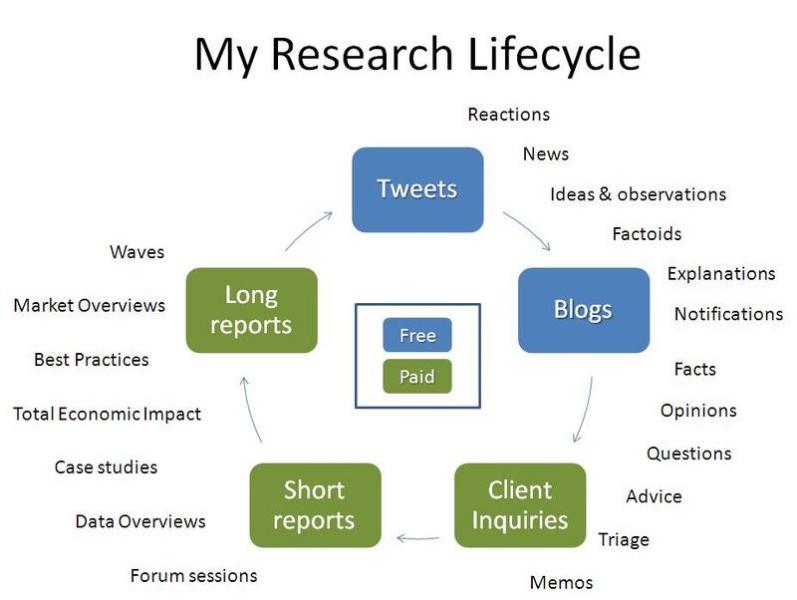Blogs and My Research Lifecycle
I’m soon getting a new tool for my work as an industry analyst: A Forrester blog. Before diving into my new blog, I think I should define its role in my work, and get your comments and suggestions.
My Forrester blog is a new part of my research lifecycle (depicted below). I’ve been pursuing some form of this research lifecycle for over 15 years.
The boxes show my five major publishing vehicles. The blog is the newest one, I’ve had most of the others for much longer. Around the lifecycle, I’ve listed the kinds of information I include in these deliverables. I’ve identified which publishing vehicles are free to all, and which ones are only available to clients who purchase Forrester subscriptions.
How does my research lifecycle work?
- It starts and ends with information. I’ve always gathered research information primarily by talking with people. Initially, I’ll get the germ of an idea, and then work the lifecycle to eventually publish fully formed ideas and analysis. But too few of the seeds I gather early on produce research reports that Forrester sells. Why?
- Because today I primarily publish information and analyses I have complete confidence in. I do a little reporting via Twitter, but that tool is way too limited. As information moves from “noon” on the lifecycle to “10 p.m.”, I gain greater confidence in my understanding of it and of the advice on that topic I can give to clients. I build confidence in a topic using a variety of techniques – broad information gathering, documentation, interviews, research and analysis methods, development and testing of theses, peer reviews, factual reviews. (Clients expect this sort of rigor from Forrester’s syndicated research.) OK; but why isn’t the rigorous research enough?
- Because immediacy – not rigor — is the key value of some information. Like news events. A blog is the perfect vehicle for me to publish news analyses. Otherwise, I have to rely on reporters to reflect my views. So what? Does the world really need even more news, opinions, and “instant analysis”?
- Yes, because all of the information I work with is part of a stream. Today, I test and discuss seed ideas and findings in a small number of conversations. A blog will allow me to open up to more people to gain more feedback and, I hope, help me more quickly gain the understanding required to write great research for Forrester clients. I also hope to provide helpful perspectives, ideas, and data in my Forrester blog.
Thus, I plan to use my blog to react to news of interest to the application development pros I serve, but also to push out ideas and observations, USA Today-style factoids, explanations that I think will help people, and notifications (aka promotional messages). If I want to explain how I define the term “application platform,” I can use the blog to do so. No one is paying for the blog, and so if basic explanations aren’t interesting to you, skip that post. (Forrester clients don’t want to see basic explanation reports in their syndicated service – trust me.) If I want to share data of interest, I can blog about them. And so on. I promise not to overdo it on self-promotion and posts that are more clever than insightful.
My blog posts will never replace the Forrester research reports that I write. How could they? A Forrester Wave™ requires at least 6 months of painstaking work. Have you looked at the detailed data in the spreadsheet behind a Wave diagram? Such reports require a much higher level of effort than a blog post, as well as a more expansive publishing format.
I find this expansion of my research lifecycle liberating. At the same time, Forrester blogs are not edited, not peer-reviewed, and fact-checked only by me. And so I recognize that I must be prudent and fair-minded in my blog posts.
My first reason to write research is to help people. My new blog must fit this mission. But I also hope that my blog posts will create conversations that help me move faster from the early inkling of understanding to the sweet spot of great value for clients. Writing great research for Forrester clients is, after all, my first responsibility (and my passion as well).
Thank you in advance for your feedback.
